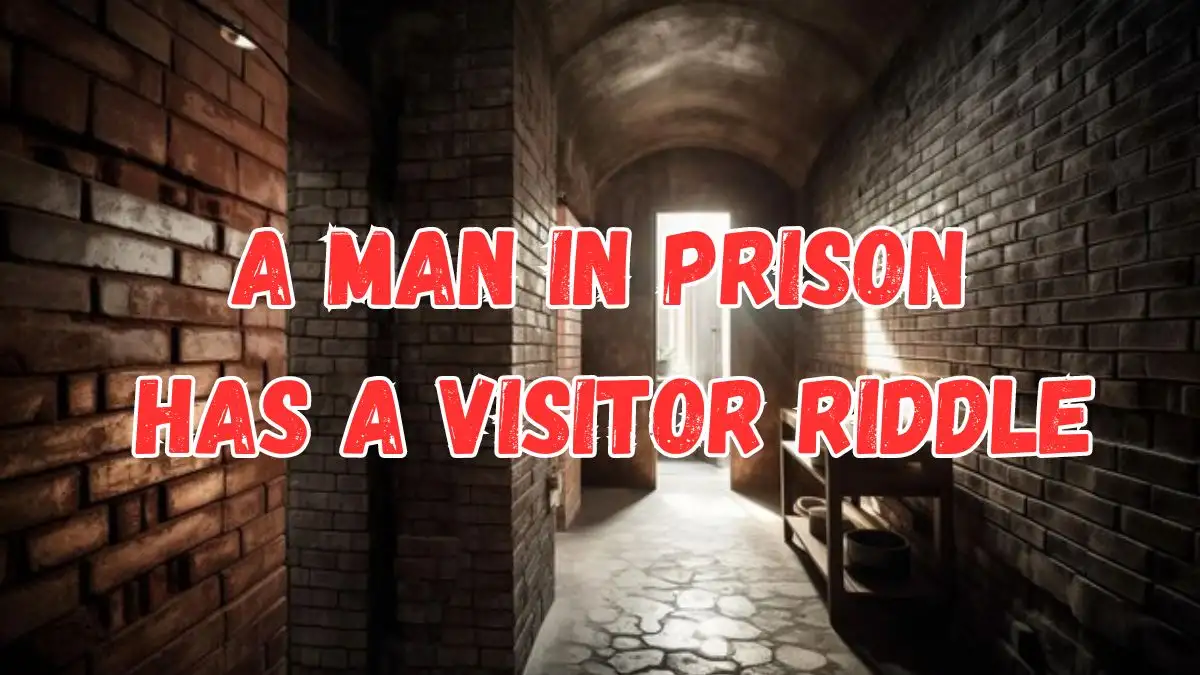A Man in Prison Has a Visitor Riddle Answer Solved And Explained
by Priyanka P
Updated Feb 20, 2024

A Man in Prison Has a Visitor Riddle
Once upon a time, there was a man who had been locked away in prison for twenty long years. Throughout all those years, he never received a single visitor. Imagine his surprise when, on the twentieth anniversary of his imprisonment, a man came to visit him. The guard was astonished too because nobody had ever come to see the prisoner before.
Curiosity burning inside him, the guard approached the prisoner and asked, "Who is this person who came to see you after all these years?The prisoner paused for a moment, considering his response carefully. Then he said something intriguing, "Brothers and sisters, I have none. That man's father is my father's son."
The guard scratched his head, trying to unravel the puzzle. What did the prisoner mean? Who could this visitor be? The words echoed in his mind as he tried to make sense of them.In those few simple sentences, a mystery unfolded, leaving the guard perplexed and intrigued. He pondered over the prisoner's words, trying to decipher their meaning and uncover the identity of the mysterious visitor.
The riddle collection spans from classic brainteasers to cryptic enigmas, offering a diverse range of challenges that cater to all puzzle enthusiasts. Find all these amazing puzzles at Fresherslive.
A Man in Prison Has a Visitor Riddle Explained
The answer to the riddle is that the visitor to the prisoner is his son.When the prisoner says, "Brothers and sisters, I have none. That man's father is my father's son," he's essentially saying that he doesn't have any siblings (brothers or sisters). Then, he mentions that the visitor's father (the man who came to see him) is his father's son.
Now, if we break down "my father's son," that refers to the prisoner himself. So, the visitor's father is the prisoner. Therefore, the visitor is the prisoner's son.
This riddle plays with language and requires some careful thought to unravel. The key is to pay close attention to the relationships described and to realize that the visitor is somehow connected to the prisoner's father. In this case, the connection is through the prisoner himself, who is the father of the visitor.
What is Riddle?
A riddle is like a fun puzzle made with words. It's a game where someone says something tricky or asks a question, but there's a secret meaning hidden inside. The aim is to make others think hard and figure out the answer.Riddles come in all shapes and sizes.
Sometimes they're simple wordplay, and other times they're more complicated tricks with language. The point is to challenge people to use their brains and imagination to find the right answer. They often use words in clever ways or have two meanings to lead you to the solution.
People have been enjoying riddles for a long time. They show up in stories, books, and even in conversations. Riddles aren't just for fun; they also help our minds stay sharp by making us think in new ways and consider different ideas.So, when someone tells you a riddle, it's like they're inviting you on a journey of thought. The joy isn't just in getting the answer right but in the adventure of figuring it out.
Advantages of Solving Riddle
- Cognitive Exercise:
- Solving riddles stimulates the brain, providing a mental workout that enhances cognitive abilities.
- Engaging with the challenge of deciphering the hidden meaning or pattern improves problem-solving skills and critical thinking.
- Language Skills:
- Riddles often involve wordplay, puns, and clever language usage, contributing to the development and enrichment of vocabulary.
- Regular exposure to riddles can enhance linguistic creativity and proficiency.
- Creativity Boost:
- The process of solving riddles encourages individuals to think outside the box, fostering creativity and imagination.
- It prompts unconventional thinking as individuals explore various possibilities to arrive at the correct solution.
- Entertainment and Fun:
- Solving riddles is an enjoyable activity, providing a source of entertainment and amusement.
- It can be a social activity, promoting interaction and friendly competition among individuals or groups.
- Educational Value:
- Riddles often convey cultural or historical insights, offering a playful way to learn about language, traditions, and societal aspects.
- They can be incorporated into educational settings to make learning more engaging.
- Boosts Confidence:
- Successfully solving a challenging riddle can instill a sense of accomplishment and boost self-confidence.
- It encourages perseverance and resilience when faced with mental challenges.
- Enhances Memory:
- Remembering and recalling the information embedded in a riddle contributes to memory improvement.
- The mental effort required for solving riddles can strengthen memory retention.
- Teaches Logical Reasoning:
- Riddles often have a logical structure, requiring individuals to follow a sequence of thoughts or deductions to arrive at the answer.
- This fosters the development of logical reasoning skills.
A Man in Prison Has a Visitor Riddle - FAQs
The visitor to the prisoner is his son.
Through the phrase "That man's father is my father's son," indicating the visitor's father is the prisoner, making the visitor his son.
The riddle presents a prisoner receiving a rare visitor, hinting at the visitor's identity through familial connections.
It involves deciphering a puzzle based on familial relationships, requiring careful attention to the prisoner's words.
The guard is astonished because no one had ever visited the prisoner during his twenty-year incarceration.







